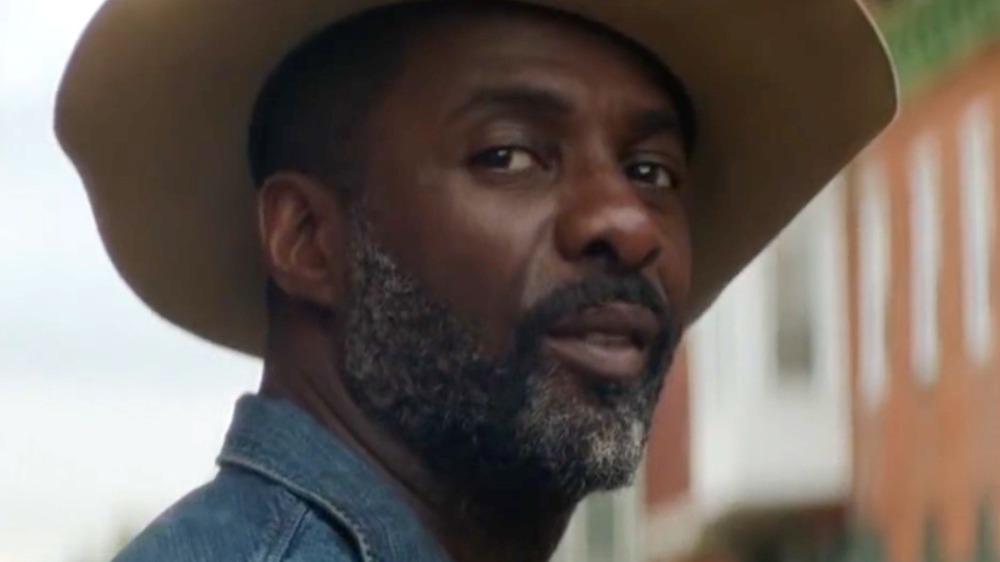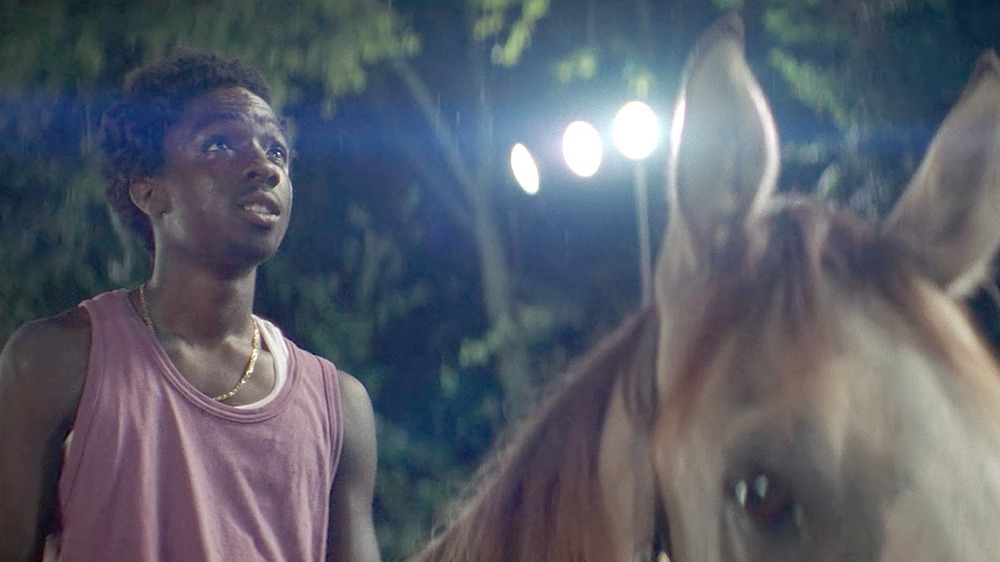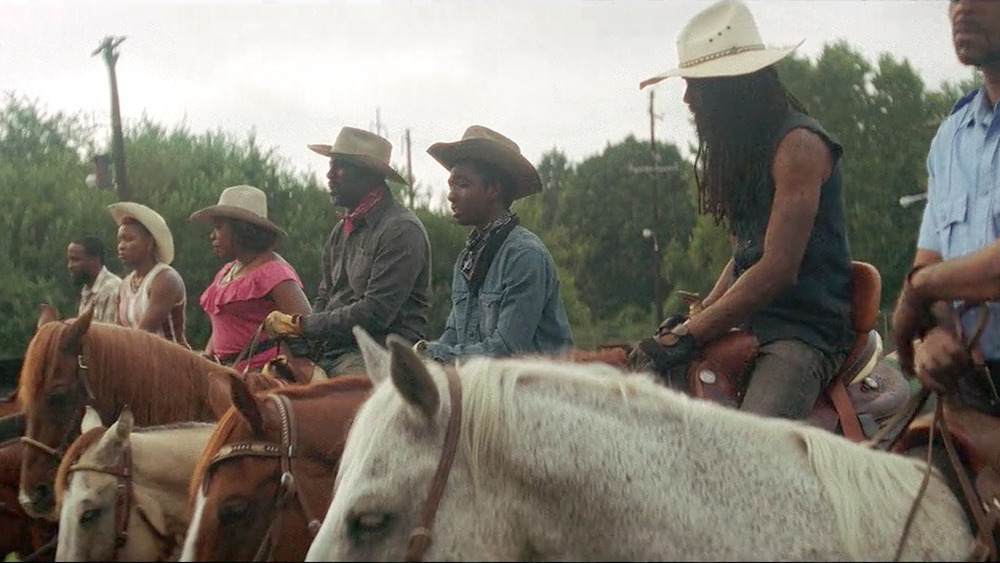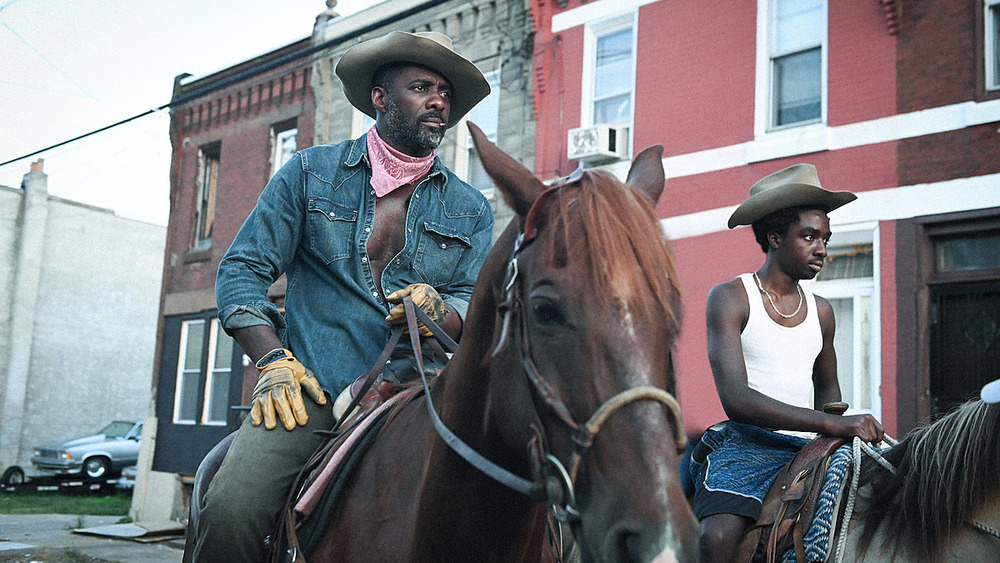The Ending Of Concrete Cowboy Explained
The new movie Concrete Cowboy dropped on Netflix Friday, and the film, which stars Idris Elba and Caleb McLaughlin, is inspired by the fictional book Ghetto Cowboy by G. Neri. The story follows a community of Black horseback riders in Philadelphia as seen through the eyes of a teenager sent to live with his estranged father after getting in trouble at school. McLaughlin of Stranger Things fame plays Cole, a 15-year-old who wants nothing more than to return home to Detroit, especially when he arrives to find a horse living inside the home of his father Harp, played by Elba.
The movie deals with some significant social issues, including gentrification and the struggle between traditional values and life on the streets for young Black men in America. Cole is welcomed to Philadelphia by his childhood friend Smush, played by Jharrel Jerome, but it's obvious Smush is running some shady and less-than-legal gigs on the side. When Harp gives Cole the ultimatum of choosing to hang with Smush or living with him, the teen feels pulled toward the streets, only to find himself with nowhere to go except back to the father he resents for laying down stringent rules. That's when he begins to learn about and bond with the Fletcher Street Riders, which are based on a real riding club in Philadelphia.
The movie's poignant ending centers largely around the closing of the club's stables, a scenario that mirrors real-life events now happening to the club that inspired the book, which was published in 2013. There's a lot to unpack, but here's what the ending of the movie means.
Concrete Cowboy's message is that only love can tame a wild heart
Although he's reluctant at first to learn more about his urban cowboy father's lifestyle, Cole soon begins to bond with other members of the horse riding club, including Nessie, Harp's neighbor and Cole's temporary mother figure played by Lorraine Toussaint. One of the movie's themes is the idea, as Nessie tells Cole, that "hard things come before good things." As the son of a single mother in Detroit, Cole was obviously on a path to trouble, and he's clearly struggling with anger issues when he arrives on Harp's doorstep. Working at the stables teaches him discipline and responsibility, and Cole bonds with a horse named Boo. The magnificent animal has a reputation for being "crazy" and hard to handle, and his future is uncertain until Cole manages to "break" him. In Boo, Cole sees a kindred spirit, and he becomes devoted to helping the animal, especially after hearing the history of cowboys as told by his new friends.
Nessie explains that cowhands were eventually called cowboys because "boys" was a derogatory term used toward Blacks, who were often the ones relied on to "break" horses. "People used to believe that breaking a horse meant crushing the will of the animal, dominating them, making them believe that the only way it was gonna survive was to submit," she says. Black people, she adds, understand that horses weren't meant to be dominated. "They were meant to be free," she says. Black people understood that the only way to train a horse was through love, not dominance. This is how Cole ultimately wins Boo's trust.
The club loses the stable but not their passion
At the end of the movie, the group of riders — which include Nessie, Rome, Paris, Esha, Harp, and Cole — gathers to watch as construction workers hired by the city begin to demolish the building used as stables. As the club rides to meet the construction crew, a bus full of Black youth watches. Their downtrodden expressions turn to smiles, implying they feel inspired by the sight of the cowboys.
When Cole demands they take action against the demolition, Harp calms the group with words of wisdom, pointing out that all of the stables where the members learned to ride have long been closed already. "Let 'em take the stables... 'cause they can't take who we are as a people," he says. "Home ain't a place. It's a fam." He adds, "That's what makes us cowboys."
The group of horsemen and women then prepares to ride off into the sunset, down but not defeated, as the stables are demolished. Later, Cole's mother returns, even though Smush had warned him he'd seen many kids dropped off on Fletcher Street, their parents never to return as promised. This highlights the movie's message that family is forever, even when the going gets rough.
Concrete Cowboy's ending mirrors real-life current events
Before the credits roll, the filmmaker notes that "The City of Philadelphia" is currently developing on Fletcher Street's land. Like the generations of cowboys before them, they ride on in search of a permanent stable to preserve their heritage.
Throughout Concrete Cowboy, characters mention that history always repeats itself, especially for Black Americans, and this jarring note seems to confirm it. The Fletcher Street Urban Riding Club is a real nonprofit organization, and the street on which the movie was filmed is now being turned into a housing complex by the city, according to Refinery29. Many horse riding clubs in urban areas have faced gentrification, being torn down in favor of upscale condominiums. This leaves riders and their horses in a predicament as to where to house the animals, and it places such riding clubs at risk of closing.
Multiple GoFundMe pages have been set up to support the riders. One was established by Ellis Ferrell of the Fletcher Street Urban Riding Club and another by the Philadelphia Urban Riding Academy. Only time will tell if the club succeeds in its efforts to provide a safe activity for inner-city Black youth.



